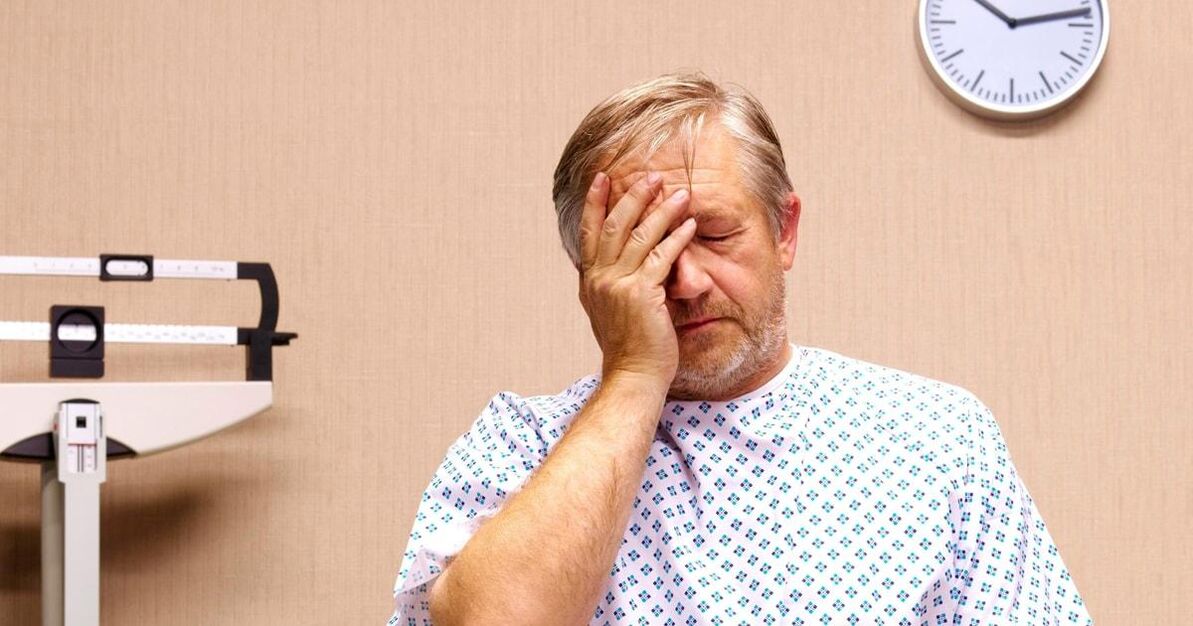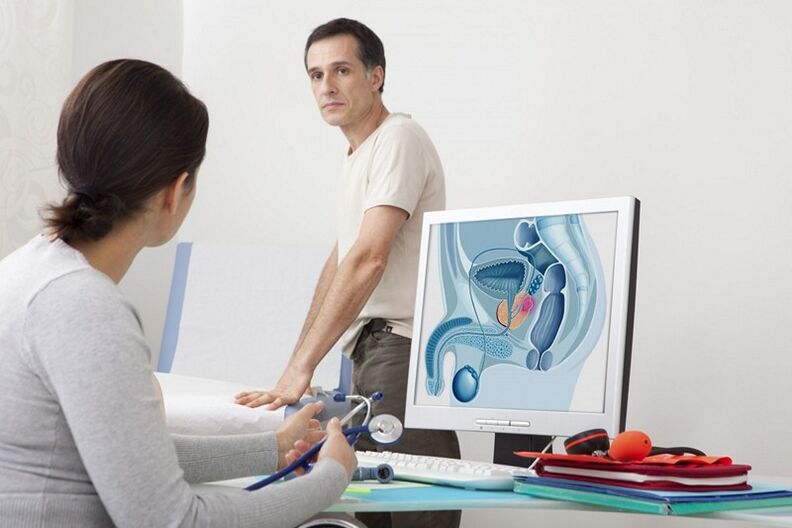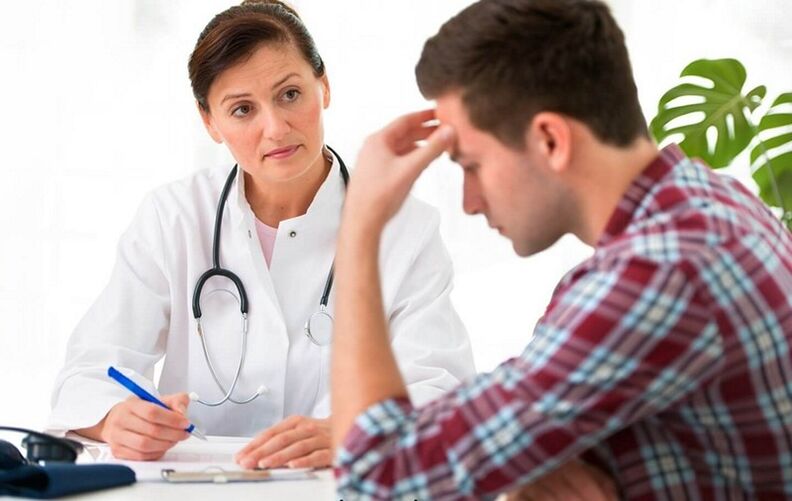One of the most common diseases in men is prostatitis. In no case should you delay treatment, since the prostate gland performs important functions, and its inflammation is provoked by a dangerous infection. What are the symptoms of prostatitis in men?

Below we will tell you by what signs this disease can be identified and considered treatment methods.
Signs of illness
As a rule, there are three types of painful symptoms:
- Genitourinary system disorders. Accompanied by a cut in the groin area when urinating and constantly wanting to go to the toilet. May excrete blood. Urinating more than once;
- Sexual dysfunction. Accompanied by pain in the tube, rectum when ejaculating. There is also the phenomenon of decreased potency, frequent ejaculation, loss of orgasm. There is also a decrease in the ability to have an erection or not at all;
- Nervous system disorder. They are accompanied by apathy, aggression, psychological and emotional distress.
Types of diseases
Chronic prostatitis
In chronic prostatitis, symptoms are present only at the time of the exacerbation. During remission, there are no symptoms. When sick, high temperature can rise, painful joints, sweating, insomnia, no appetite, lethargy, fever, chills. Headache is not excluded.
This type of disease occurs when a fungus or virus has entered the organs of the lower pelvis. Representatives of that fauna are E. coli, staphylococcus, chlamydia. It can be noted that Helicobacter is not on the list of causes - this is natural, since it does not cause prostatitis.
Of course, each of us has germs that cause illness. However, the human body is designed in such a way that the immune system prevents them from reproducing. Therefore, if the protective function is impaired, the man easily becomes a hostage of inflammatory processes. When you have the first symptoms, you need to see a doctor. The doctor will conduct a rectal exam, do the necessary tests, and prescribe a course of treatment.
Bacterial prostatitis
This is a disease caused by bacteria. Symptoms are the same as in chronic prostatitis. It is a bacterial prostatitis that often turns to a chronic form. It is necessary to treat such inflammation in a comprehensive way. Only with the joint effect of drugs, prostate massage and other physiotherapeutic procedures can the disease progress to the chronic stage.
A urologist is authorized to prescribe antibiotics. They destroy all pathogenic microorganisms. It is very important to get to your doctor's appointment on time. You cannot stop taking the medicine after your condition has improved, as you could worsen the results and have the disease for many years.
sclerosing prostatitis
Sclerosing prostatitis manifests in people with persistent constipation, as well as from taking certain medications. The disease is manifested by a decrease in the prostate gland and thickening of tissues - this type of disease cannot be cured.
Prostatitis
The cause of this type of prostate disease is still unknown. Accompanied by pain in the groin area. Treatment is indicated for each patient.
Bacterial prostatitis
Bacterial prostatitis develops due to stagnation of semen, circulatory disorders. However, the most common cause is zinc deficiency. It is an important constitutive element in the male reproductive system. Zinc is responsible for the correct production of hormones, potency and reproductive function of the body.
Such a disease is accompanied by pulling sensations in the groin, lower abdomen and perineum. Sometimes there is pain in the back and tailbone. This condition can last for several months. During treatment, anti-inflammatory and hormonal drugs are prescribed, as well as herbal remedies.
Asymptomatic prostatitis
The peculiarity of asymptomatic prostatitis is that the disease progresses without any symptoms. Unfortunately, the disease manifests itself at a late stage. At this time, the prostate gland is greatly enlarged, the ability to urinate is reduced. To confirm the disease, the urine is analyzed for bacteria and white blood cells. Such prostatitis often becomes chronic.
If you do not have an erection in the morning and often have urges to go into the dark, then this indicates the onset of the disease.
Prompt treatment should not be neglected because prostatitis can become chronic. It can also damage your bladder, making it difficult to go to the bathroom. Indifference to one's health threatens infertility, abscesses, cystitis and sepsis. Some consequences can only be cured by being able to function.
Do not attempt treatment without the help of specialists. Please consult your healthcare professional before using any method.
Is prostatitis contagious and how is it treated?
Sex life with prostatitis is not forbidden. After all, it was her absence that led to this terrible disease. The presented disease is associated only with stronger sex. However, semen contains inflammatory factors. So, if such sperm enter a woman's genitals, serious problems with the woman's reproductive function can arise. Protecting yourself and maintaining a healthy lifestyle is very important.
Prostate massage
This prostatitis treatment is indicated as an adjunct therapy. Moreover, massage is a great disease prevention. With its help, the urologist can understand what stage the tumor is in. Prostate massage can help prevent sperm buildup, which is a common cause of inflammation.
This procedure relaxes the gland, improving blood circulation and oxygen delivery to the organ. It also relieves unpleasant symptoms, unpleasant sensations, prevents the development of cancer and normalizes urination.
Urology treatment
When you go to the clinic, you will most likely be prescribed medication or surgery. It all depends on the stage of the disease.

Take the drug only on the advice of a specialist, as some drugs have a number of contraindications.
If the disease does not respond to drug treatment, the patient will be referred to surgery. The most common method is transurethral resection. In this procedure, the tumor is removed through the urethra. Most often, this type of surgery is prescribed at the middle stage of the development of the disease, in the absence of infectious lesions. This type of intervention does not preserve sexual function.
The best solution is the minimally invasive method. With this method, a puncture is made in the skin, then in the bladder the damaged tissue is removed. However, among the advantages are the low chance of injury and the penetration of infection, without complications. Such a surgery is available at any stage of the disease.
Recommendations
Special attention should be paid to the diet. Try to eliminate fatty, heavy, spicy and fried foods from your diet forever. Do not abuse flour products, cakes and pickles. Adjust your menu. Eat only natural and healthy foods, including vegetables and fruits, nuts, lean meats, dried fruits, freshly squeezed juices.
Avoid alcoholic beverages, coffee, eggs, fatty meats and mushrooms. Forget about fatty soups, hot condiments, and carbonated drinks.
Take a relaxing bath with herbal teas like chamomile. It perfectly copes with inflammation, removes toxins, helps the functioning of the kidneys and liver, restores metabolism. It is worth noting the need for physical activity. Gentle exercise, swimming in the pool, walking in the morning and following a special diet will help prevent prostate disease.

If you've had prostatitis once, see your urologist once a year. This is necessary to monitor your condition and prevent the disease from recurring.































